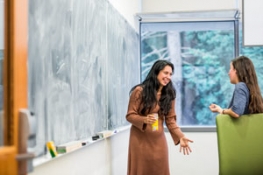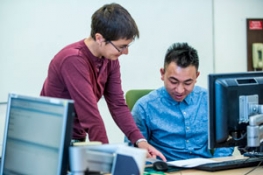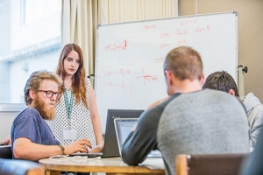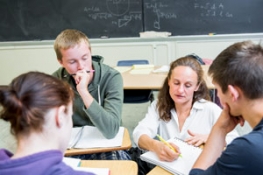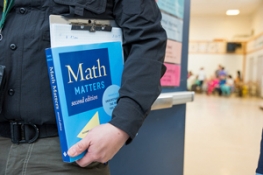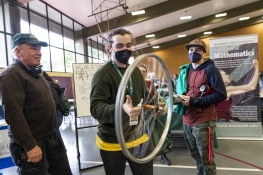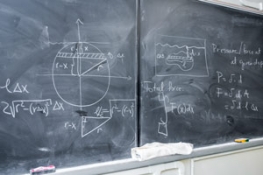Mathematics, B.A.
Mathematics is about conceptualizing and solving abstract problems. These skills are more crucial than ever in our continually changing and increasingly complex world.
Through a rigorous curriculum, students learn to conceptualize problems and explore the art and beauty of rational reasoning and discourse.
With the support of faculty and a variety of opportunities both in and out of the classroom, students will develop basic analytical skills and sharpen their ability to think logically, work with abstract ideas and recognize patterns and structures.
Close-Knit Community
Your experience begins with the foundation of the department—our professors—who care about your success. They’re as passionate about mentoring as they are teaching. Because class sizes are small, professors will know you by name and can work with you one-on-one. With a wide variety of department activities such as Math Club, national and international mathematical contests, a lively speaker series and student research opportunities, we build strong relationships between faculty and students and among students in our program.
Hands-on Learning
Our students are actively involved in their learning and can select extracurricular activities which match their interests and goals. Past examples include working with K-12 students and teachers in the local elementary and middle schools, working with the department's supercomputer to model nuclear fusion, or conducting novel research with a faculty member. Recent examples of student research projects include building math models of the zebrafish brain, modeling the immune response to SARS-Co-V2, and building a recommender system to help incoming students choose a major.
A recent project example:
Each year, teams of students participate in the international Mathematical Contest in Modeling which challenges teams to clarify, analyze, and propose solutions to open-ended problems. The contest is international in scope, drawing over seven thousand teams from around the world. The problems are timely, important, and open-ended. For example, past problems have been related to eradicating Ebola or analyzing political stability. Cal Poly Humboldt teams have received high honors in this competition. Groups of students and faculty are invited to attend the Whiskeytown Lake Mathematics Congress which combines a weekend of camping and rafting with mathematics and connects us with our sister CSUs in Northern California and schools in southern Oregon. Our department also supports peer tutoring and mentoring, which builds a strong student community. Students and faculty can work on problems in our research lounge.
After Graduation
What can you do with a Mathematics degree?
It’s a question students often ask, which is why we’ve made career advising a cornerstone of our program and encourage them to start thinking about their future. Through advising, activities, and courses, we help students understand the versatility of a math degree and explore vast career options.
We focus on the job search process, as well by mindfully embedding career preparation activities throughout the courses, and partner with Humboldt's advising center to ensure students receive advice about career preparation and options after graduation.
Students leave our program with more than a degree. They are equipped to think critically and analytically, and can apply these skills to any domain. Our graduates have a track record of securing great employment, or gaining entrance in masters or doctorate programs in mathematics and related fields.
Learn more about our what our Alumni are doing.
Academics & Options
Mathematics students at Cal Poly Humboldt find an active and supportive atmosphere that provides preparation for mathematics-related careers and mentorship for graduate studies. The department offers a variety of scholarships (need-based and merit-based) for mathematics majors at every level and including transfer students. Students have access to several campus computer labs including one dedicated to mathematical applications.
Courses in calculus, linear algebra, differential equations, computer programming, analysis and statistics comprise the program’s core.
A math major's culminating experience is a semester-long Capstone course in which they delve deeply into a topic in contemporary mathematics. This might be a novel research project, or a deep dive into a topic not explicitly taught in the curriculum. The courses prior to the Capstone prepare our scholars for this independent and student-led project.
We’re a lively, student-centered program that’s distinguished for fostering future scholars, our work in math education, and expertise in the application of mathematical principles to other sciences, such as modeling nuclear fusion in the sun, or the interaction of cancer cells and immune cells.
About the Degree
B.A. in Mathematics
Prepares students with competence in and fundamental understanding of the discipline of mathematics and fluency in the mathematical language.
B.A. in Mathematics prerequisite flowchart (beginning in MATH 101 - College Algebra)
B.A. in Mathematics prerequisite flowchart (beginning in MATH 102 - Precalculus)
B.A. in Mathematics prerequisite flowchart (beginning in MATH 109 - Calculus 1)
Minors
Minors in Mathematics are created on an individual basis between the student and the department chair. The Applied Statistics minor provides broad statistical knowledge and skills to research and how to manage problems in a wide variety of disciplines. The introductory, intermediate, and topics courses include computer laboratory sessions where students learn to use statistical software.
Catalog Information

